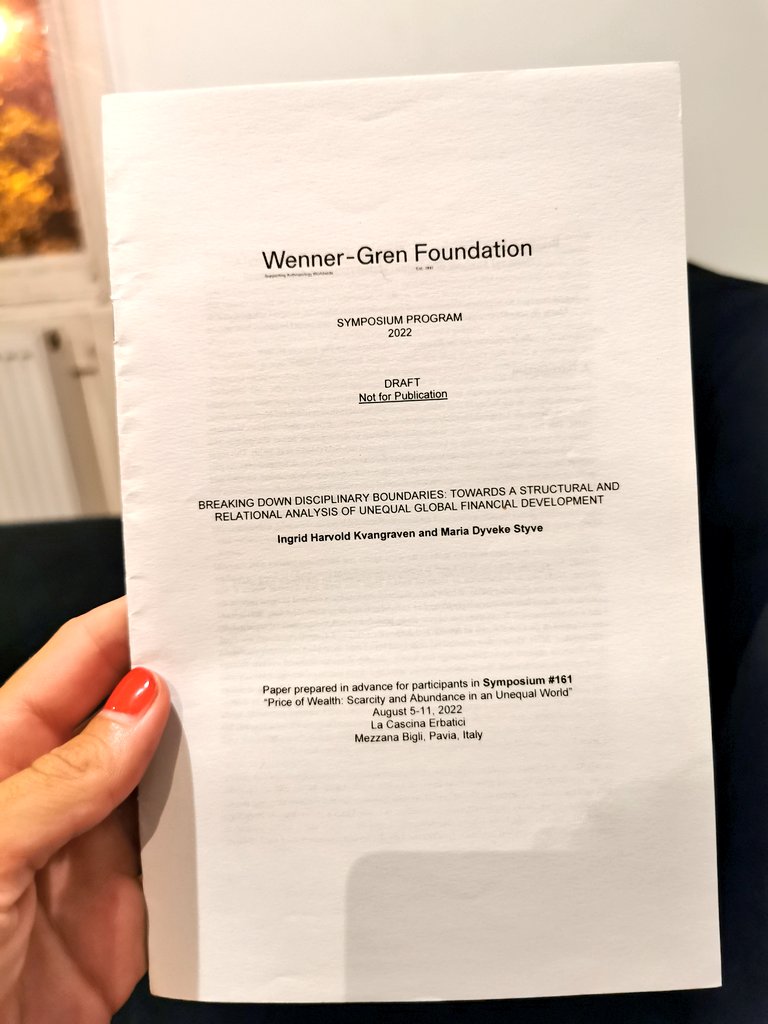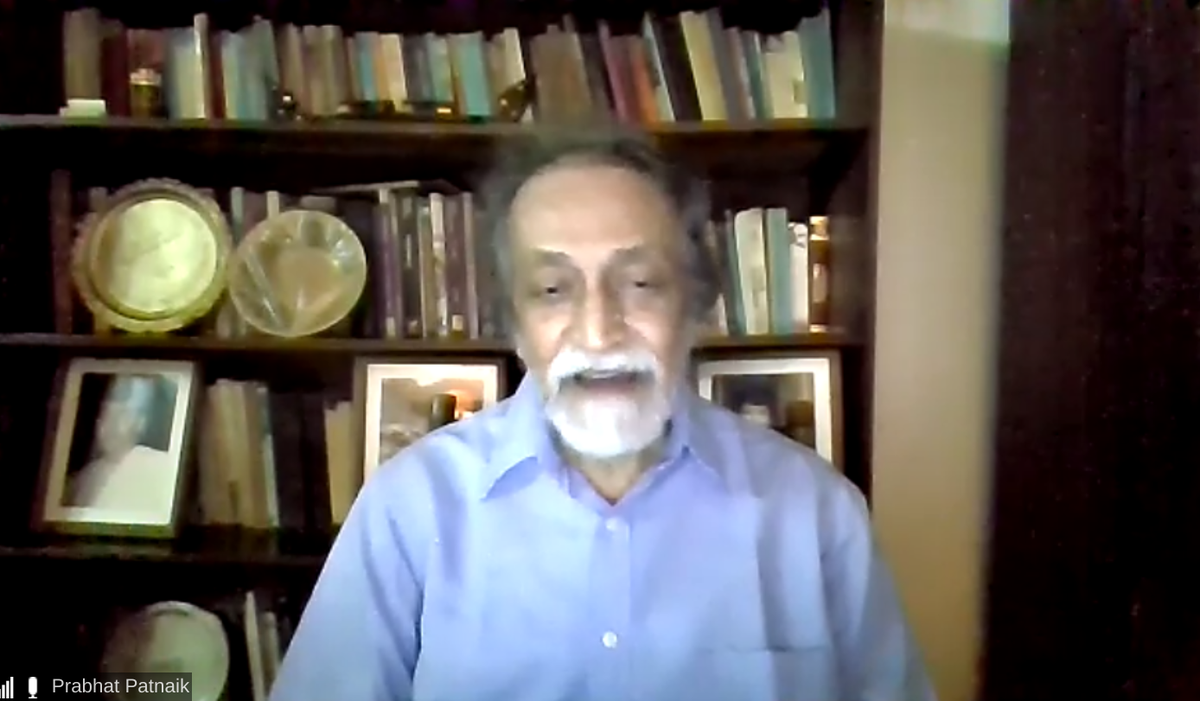
Economists can learn from anthropologists.
I mean it! And not in a "they provide valuable context for our research" kind of way.
Anthro can help us understand financial processes & structures of oppression. Anthro can help us theorise.
Some resources & anthros to follow👇
I mean it! And not in a "they provide valuable context for our research" kind of way.
Anthro can help us understand financial processes & structures of oppression. Anthro can help us theorise.
Some resources & anthros to follow👇
Markets of Dispossession by @JElyachar dukeupress.edu/markets-of-dis…
Best Practice: Management Consulting and the Ethics of Financialization in China by @KimberlyZChong
dukeupress.edu/best-practice
Best Practice: Management Consulting and the Ethics of Financialization in China by @KimberlyZChong
dukeupress.edu/best-practice
Forensics of Capital by @topdogunderdog
degruyter.com/document/doi/1…
Social Collateral: Women and Microfinance in Paraguay’s Smuggling Economy by @CarlySchuster
ucpress.edu/book/978052028…
Uncivil City: Ecology, Equity and the Commons in Delhi by Amita Baviskar
us.sagepub.com/en-us/nam/unci…
degruyter.com/document/doi/1…
Social Collateral: Women and Microfinance in Paraguay’s Smuggling Economy by @CarlySchuster
ucpress.edu/book/978052028…
Uncivil City: Ecology, Equity and the Commons in Delhi by Amita Baviskar
us.sagepub.com/en-us/nam/unci…
Banking on Uncertainty: Debt, Default, and Violence in Indian-Administered Kashmir (forthcoming by @ntrisal)
Gustavo Lins Ribeiro's work on decolonization, imperialism and anthro. For example: taylorfrancis.com/chapters/edit/…
Gustavo Lins Ribeiro's work on decolonization, imperialism and anthro. For example: taylorfrancis.com/chapters/edit/…
The Euro and Its Rivals: Currency and the Construction of a Transnational City by @GustavPeebles
iupress.org/9780253223203/…
(also check out his article "The Anthropology of Credit and Debt" annualreviews.org/doi/abs/10.114…).
iupress.org/9780253223203/…
(also check out his article "The Anthropology of Credit and Debt" annualreviews.org/doi/abs/10.114…).
Everything Isabelle Guérin has written on debt. E.g.: Juggling with Debt, Social Ties, and Values journals.uchicago.edu/doi/full/10.10…
A lot of @danilynfox's work too, but the article that caught my attention most is "Kinky empiricism" on anthropological methods:
anthrosource.onlinelibrary.wiley.com/doi/abs/10.111…
A lot of @danilynfox's work too, but the article that caught my attention most is "Kinky empiricism" on anthropological methods:
anthrosource.onlinelibrary.wiley.com/doi/abs/10.111…
Work by @TinyMuslimah on #BlackLivesMatter is crucial, e.g. Prayer, protest & police brutality: Black Muslim spiritual resistance in the Ferguson era. And look out for @ErinBimmons' work on UK anti-austerity movements & their resistance to metrics coming out of her @NSSRNews PhD.
I had the pleasure of meeting all those cool anthros and engaging with their work this week at a @WennerGrenOrg Symposium in Italy, organized by the fabulous @TheNewSchool Profs @GustavPeebles @tghilarducci & @rickmcgahey. 

Beyond the cool anthros I met this week, what first inspired me to take anthro more seriously was ofc:
@mariadyveke: From Marikana to London. The Anti-Blackness of Mining Finance
@paulrgilbert: Speculating on sovereignty: ‘money mining’ at the extractive industry frontier.
@mariadyveke: From Marikana to London. The Anti-Blackness of Mining Finance
@paulrgilbert: Speculating on sovereignty: ‘money mining’ at the extractive industry frontier.
Finally, I learned a lot from fellow econs too! A real pleasure to engage w/the work & ideas of @DarrickHamilton @gchelwa @Jayati1609 @VimalRanchhod @nelsonhbarbosa @snaidunl @tghilarducci & @rickmcgahey.
But the greatest joy of the week was ofc the nightly karaoke sessions ;)
But the greatest joy of the week was ofc the nightly karaoke sessions ;)
Please do add any additional resource suggestions that should be included in this econ-anthro thread (I haven't even looked at my notes from the week yet, but know a giant to-read list will emerge from them!!).
Interesting to see that a lot of problems we have in econ are mirrored in anthro: deep structural hierarchies, colonial research, highly problematic research ethics. The big difference is the radical anthros resisting this are still to be found in top anthro institutions.
And here are some insights into what anthros can take away from econ (we were mostly heterodox at the Symposium altho we didn't all agree on using the term), summarised by @JElyachar 👇
Am really hoping for more interdisciplinary exchanges like this!
Am really hoping for more interdisciplinary exchanges like this!
https://twitter.com/JElyachar/status/1558105616970817542?t=ITL5n5KqpJ5YyDli7UysSA&s=19
This project also inspired us to embark on this transdisciplinary paper with @mariadyveke on how we need structural & relational analyses to understand unequal global financial development (thanks also @paulrgilbert for initial feedback). Look forward to taking it to @ReviewofPE. 

• • •
Missing some Tweet in this thread? You can try to
force a refresh









